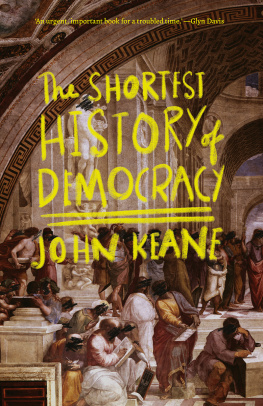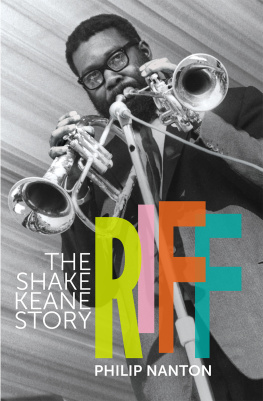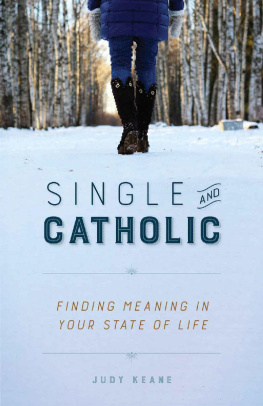John Keane - The Life and Death of Democracy
Here you can read online John Keane - The Life and Death of Democracy full text of the book (entire story) in english for free. Download pdf and epub, get meaning, cover and reviews about this ebook. year: 2009, publisher: Simon & Schuster, Limited, genre: Politics. Description of the work, (preface) as well as reviews are available. Best literature library LitArk.com created for fans of good reading and offers a wide selection of genres:
Romance novel
Science fiction
Adventure
Detective
Science
History
Home and family
Prose
Art
Politics
Computer
Non-fiction
Religion
Business
Children
Humor
Choose a favorite category and find really read worthwhile books. Enjoy immersion in the world of imagination, feel the emotions of the characters or learn something new for yourself, make an fascinating discovery.
- Book:The Life and Death of Democracy
- Author:
- Publisher:Simon & Schuster, Limited
- Genre:
- Year:2009
- Rating:5 / 5
- Favourites:Add to favourites
- Your mark:
- 100
- 1
- 2
- 3
- 4
- 5
The Life and Death of Democracy: summary, description and annotation
We offer to read an annotation, description, summary or preface (depends on what the author of the book "The Life and Death of Democracy" wrote himself). If you haven't found the necessary information about the book — write in the comments, we will try to find it.
The Life and Death of Democracy — read online for free the complete book (whole text) full work
Below is the text of the book, divided by pages. System saving the place of the last page read, allows you to conveniently read the book "The Life and Death of Democracy" online for free, without having to search again every time where you left off. Put a bookmark, and you can go to the page where you finished reading at any time.
Font size:
Interval:
Bookmark:
LIFE AND
DEATH OF
DEMOCRACY
Also by John Keane
VIOLENCE AND DEMOCRACY
GLOBAL CIVIL SOCIETY?
WHATEVER HAPPENED TO DEMOCRACY?
VCLAV HAVEL: A POLITICAL TRAGEDY IN SIX ACTS
CIVIL SOCIETY: OLD IMAGES, NEW VISIONS
TOM PAINE: A POLITICAL LIFE
THE MEDIA AND DEMOCRACY
REFLECTIONS ON VIOLENCE
DEMOCRACY AND CIVIL SOCIETY

First published in Great Britain by Simon & Schuster UK Ltd, 2009
A CBS COMPANY
Copyright John Keane 2009
This book is copyright under the Berne convention.
No reproduction without permission.
All rights reserved.
The right of John Keane to be identified as the author of this work has been asserted by him in accordance with sections 77 and 78 of the Copyright, Designs and Patents Act, 1988.
1 3 5 7 9 10 8 6 4 2
Simon & Schuster UK Ltd
1st Floor
222 Grays Inn Road
London WC1X 8HB
www.simonandschuster.co.uk
Simon & Schuster Australia
Sydney
Excerpt from Burnt Norton in Four Quartets by T. S. Eliot 1936 by Harcourt, Inc. and renewed 1964 by T.S. Eliot, reprinted by permission of Houghton Mifflin Harcourt Publishing Company.
Excerpt from Little Gidding in Four Quartets 1942 by T. S. Eliot and renewed 1970 by Esme Valerie Eliot, reprinted by permission of Houghton Mifflin Harcourt Publishing Company.
Excerpts from T. S. Eliot, The Complete Poems and Plays of T. S. Eliot, reproduced by kind permission of Faber and Faber Ltd/ T. S. Eliot Estate.
Every reasonable effort has been made to contact copyright holders of material reproduced in this book. If any have inadvertently been overlooked, the publishers would be glad to hear from them and make good in future editions any errors or omissions brought to their attention.
A CIP catalogue record for this book is available from the British Library.
ISBN: 978-1-84737-760-9
Typeset in Sabon by M Rules
Printed in the UK by CPI Mackays, Chatham ME5 8TD
For Alice and George
CONTENTS
Time present and time past
Are both perhaps present in time future
And time future contained in time past.
T. S. Eliot, Burnt Norton, Four Quartets (1936)
History is often said to be a catalogue of human sorrows, an unending story of bootlicking, a slaughterhouse of crimes. It is not always so. The mould of cruel servitude can be shattered, as happened 2600 years ago, when Greeks living on the south-eastern fringes of Europe laid claim to an invention that now ranks in historical importance with the wheel, the printing press, the steam engine and the cloning of stem cells. Born of resistance to tyranny, their claimed invention at first caused no great stir. Few spotted its novelty. Some condemned it for bringing chaos into the world. Nobody predicted its universal appeal. It seemed simply to be part of the great cycle of human affairs yet one more example of power struggles among foes. The invention was soon to be seen differently. It was to magnetise millions and to arouse passions on a world scale, understandably so, since it required human beings to picture themselves afresh, to live as they had never before lived. The invention was a potent form of wishful thinking that is still with us today: the Greeks called it d mokratia.
mokratia.
Wishful thinking the longing to bend the present world into a different and better future is often mocked, but the plain fact is that it is a regular feature of the human condition. Whenever we refer to the world around us in language, we habitually allude to things that are absent. We conjecture, we say things that miss the mark, or that express yearnings for things to be other than they are. We live by our illusions. The language through which we speak is an unending series of short little dreams, in the course of which we sometimes fashion new ways of saying things, using words that are remarkably apposite, and strangely inspiring to others. The feminine noun d mokratia was one of those tiny terms that sprang from a little dream, with grand effect. It was to rouse many millions of people in all four corners of the world and give them a hand in getting a grip on their world by changing it in ways so profound that they remain undervalued, or misunderstood. In contrast to things whose names immortalise their inventors newtons, Hoovers, Rubiks Cubes for example democracy has no known wordsmith. The roots of the family of terms that make up the language of democracy, and exactly where and when the word was first used, remain a mystery. Democracy carefully guards her secrets. Through the fog of the past only random clues appear, in the guise of wild-looking, ungroomed figures bearing suggestive names like Demonax of Mantinea, the bearded, robed, sandal-shod lawmaker who was summoned (around 550 BCE ) by the women of the Oracle of Delphi to grant the people of Cyrene, a Greek-speaking farming town on the Libyan coast, the right to resist the tyranny of the limping, stuttering King Battus III, and the right to gather in their own assembly, to govern themselves, under their own laws.
mokratia was one of those tiny terms that sprang from a little dream, with grand effect. It was to rouse many millions of people in all four corners of the world and give them a hand in getting a grip on their world by changing it in ways so profound that they remain undervalued, or misunderstood. In contrast to things whose names immortalise their inventors newtons, Hoovers, Rubiks Cubes for example democracy has no known wordsmith. The roots of the family of terms that make up the language of democracy, and exactly where and when the word was first used, remain a mystery. Democracy carefully guards her secrets. Through the fog of the past only random clues appear, in the guise of wild-looking, ungroomed figures bearing suggestive names like Demonax of Mantinea, the bearded, robed, sandal-shod lawmaker who was summoned (around 550 BCE ) by the women of the Oracle of Delphi to grant the people of Cyrene, a Greek-speaking farming town on the Libyan coast, the right to resist the tyranny of the limping, stuttering King Battus III, and the right to gather in their own assembly, to govern themselves, under their own laws.
forward within most Greek plays, poems and philosophical tracts, that fifth century Athens wins the prize for creating both the idea and the practice of democracy, seemed plausible to contemporaries. It continues until this day to be repeated by most observers. But it is false.
The Life and Death of Democracy, the first attempt to write a life and times of democracy for well over a century, shows that the little word democracy is much older than classical Greek commentators made out. Its roots are in fact traceable to the Linear B script of the Mycenaean period, seven to ten centuries earlier, to the late Bronze Age civilisation (c. 15001200 BCE ) that was centred on Mycenae and other urban settlements of the Peloponnese. It is unclear exactly how and when the Mycenaeans learned to use the two-syllable word d mos, to refer to a group of powerless people who once held land in common, or three-syllable words like damokoi, meaning an official who acts on behalf of the d
mos, to refer to a group of powerless people who once held land in common, or three-syllable words like damokoi, meaning an official who acts on behalf of the d mos. What is also unclear is whether these words, and the family of terms we use today when speaking about democracy, have origins further east, for instance in the ancient Sumerian references to the dumu, the inhabitants or sons or children of a geographic place. But these uncertainties are tempered by another remarkable discovery by contemporary archaeologists: it turns out that the democratic practice of self-governing assemblies is also not a Greek innovation. The lamp of assembly-based democracy was first lit in the East, in lands that geographically correspond to contemporary Syria, Iraq and Iran. The custom of popular self-government was later transported eastwards, towards the Indian subcontinent, where sometime after 1500 BCE , in the early Vedic period, republics governed by assemblies became common. The custom also travelled westwards, first to Phoenician cities like Byblos and Sidon, then to Athens, where during the fifth century BCE it was claimed as something unique to the West, as a sign of its superiority over the barbarism of the East.
mos. What is also unclear is whether these words, and the family of terms we use today when speaking about democracy, have origins further east, for instance in the ancient Sumerian references to the dumu, the inhabitants or sons or children of a geographic place. But these uncertainties are tempered by another remarkable discovery by contemporary archaeologists: it turns out that the democratic practice of self-governing assemblies is also not a Greek innovation. The lamp of assembly-based democracy was first lit in the East, in lands that geographically correspond to contemporary Syria, Iraq and Iran. The custom of popular self-government was later transported eastwards, towards the Indian subcontinent, where sometime after 1500 BCE , in the early Vedic period, republics governed by assemblies became common. The custom also travelled westwards, first to Phoenician cities like Byblos and Sidon, then to Athens, where during the fifth century BCE it was claimed as something unique to the West, as a sign of its superiority over the barbarism of the East.
Like gunpowder, print and other imports from afar, the arrival of popular assemblies and (later) the strange-sounding word
Font size:
Interval:
Bookmark:
Similar books «The Life and Death of Democracy»
Look at similar books to The Life and Death of Democracy. We have selected literature similar in name and meaning in the hope of providing readers with more options to find new, interesting, not yet read works.
Discussion, reviews of the book The Life and Death of Democracy and just readers' own opinions. Leave your comments, write what you think about the work, its meaning or the main characters. Specify what exactly you liked and what you didn't like, and why you think so.










